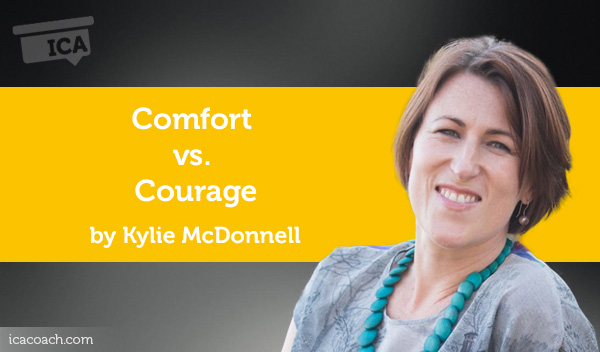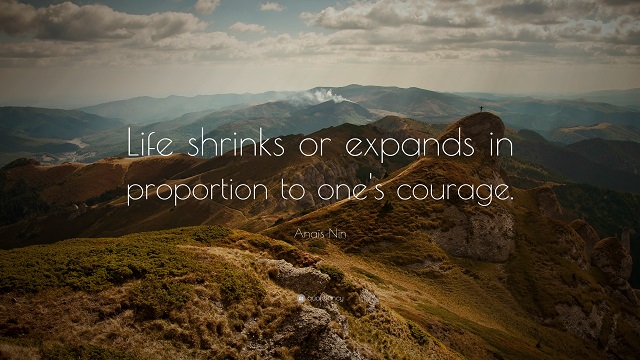
A Coaching Power Tool Created by Kylie McDonnell
(Life Transition Coach, UNITED KINGDOM)

In any given moment we have a choice: To step forward into growth or to step back into safety.~Abraham Maslow
You can choose courage or you can choose comfort but you cannot choose both ~ Brene Brown
Have you ever watched a small child learn how to walk? They crawl first and then lift themselves up and hold onto something, they might balance against it, fall on their backside, maybe have a giggle, or frown, but always climb back up and try again. The process varies from child to child but no child just wakes up one day walking. It’s a process and each part of this step-by-step process is a necessary step that leads to the next. Children would never learn how to walk if they were reluctant to leave the safety of holding onto the table.
We might not typically associate the word courage with a child learning how to walk because it’s an instinctive process but this example is designed to illustrate that stepping out of our comfort zone is written into our DNA as humans. Watching a child learn how to walk is a powerful reminder that the process of growth, learning and evolving, whilst not easy or linear, is our birthright. What we experience to varying degrees as we grow from children into adults is this programming to learn and evolve being at odds with a desire for safety and an aversion to uncertainty, vulnerability and discomfort. Humans are complex. We have an amazing capacity to learn yet we also crave comfort and our brains love a short cut – the more routine we have, the more time we save, the less effort exerted. Therefore, the relationship we cultivate with this paradox, our polar opposite tendency to seek both comfort and evolution is key to our well being, confidence and integrity.
If we fast-forward seven years to the same child learning how to ride a bike, seven years of life experience that has instilled an awareness of fear, then it is courage that a child practices when taking off the training wheels for the first time. Any action that takes us from what is familiar and comfortable to what we want to learn and become is uncertain and vulnerable, and according to Dr Brene Brown
vulnerability is our most accurate measurement of courage.
Comfort
The Oxford dictionary defines comfort as “a state of physical ease and freedom from pain or constraint.” So our “comfort zone” is where we feel physically and emotionally safe. It is also what we know – the perception of certainty, cultivated through habits, routines and preferences – it’s where we know what to expect, where we don’t feel vulnerable and where things feel familiar. For example, a house you’ve lived in for 10 years or a career you’ve been building for just as long. It could also be planning routine meals during a working week to save cooking time and money.
But comfort has a shadow side. Sometimes what is comfortable stops us from challenging ourselves, learning new things and living lives that inspire us. Once upon a time a desire to be safe stopped humans from getting eaten by saber-toothed tigers, however, in the modern world a desire to be safe and comfortable can have us responding to non-life threatening new experiences with a similar level of fear, preventing us from reaching for new experiences. The examples above illustrate when the comfort of a routine can be supportive: the house you’ve lived in for 10 years might be your dream home and the career you’ve been building might offer a sense of purpose. But what if you dream of living in a new city of the countryside and are miserable in your job? What is the cost of the familiarity then? Similarly with routine meals during the week, what if you don’t value saving time and money when it comes to weekly food preparation? What if your goal is to cook creatively and feel inspired in the kitchen? Then perhaps the comfort of this routine is getting in the way of reaching the goal. Sometimes the “comfort” of habits, routine and familiarity can simplify our lives, save time and money and offer an anchor in a busy life. Sometimes though, what is easy, cheap, fast and convenient isn’t aligned with our values of what it means to us to live a fulfilling life. Comfort doesn’t always support us.